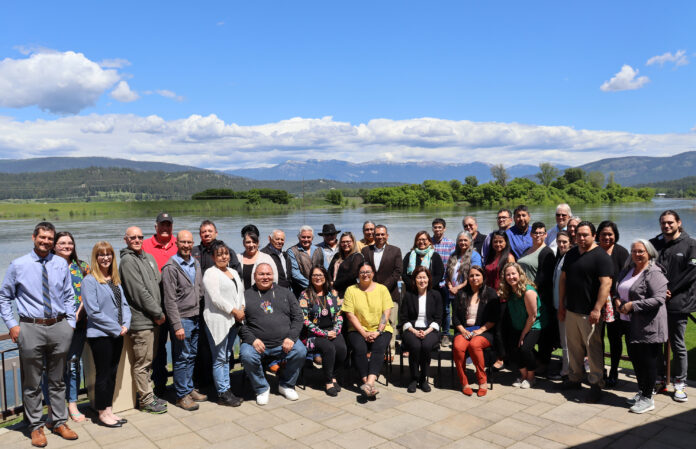Water pollution in the Kootenay watershed has six Ktunaxa Nation governments and several U.S. federal agencies calling on Canada to take part in a submission to the International Joint Commission (IJC).
Ktunaxa Nation officials said Nasuʔkins (Chiefs) and council members from every local Ktunaxa government met to discuss the issue on June 7 in Bonners Ferry, Idaho.
This included representatives from Yaq̓it ʔa·knuqⱡi’it First Nation (Tobacco Plains), ʔakisq̓nuk First Nation (Windermere), Yaqan Nuʔkiy (Lower Kootenay Band), ʔaq̓am (Cranbrook), K’upawiȼq̓nuk (Ksanka Band, Confederated Salish and Kootenay Tribes of the Flathead Reservation), and ʔaq̓anqmi (Kootenai Tribe of Idaho).
The Indigenous nation met with the U.S. Department of State, the U.S. Environmental Protection Agency, and the U.S. Geological Survey.
“We met with our sister Tribes and the U.S. Government to discuss the next steps in addressing the pollution issue in the Kootenay watershed,” said Yaq̓it ʔa·knuqⱡi’it Nasuʔkin Heidi Gravelle. “The governments of the Ktunaxa Nations formally asked the Government of Canada to participate in a joint reference to the International Joint Commission, which would help ensure the matter is addressed objectively.”
According to Ktunaxa officials, the Nation’s request has been outstanding since December of 2021. By April of this year, however, Global Affairs Canada said they would no longer be considering an IJC submission.
The Ktunaxa Nation Council followed this up with a letter, requesting the federal government reconsider the decision, but no formal response has been sent back yet.
“It’s a disappointment, and a sad day for reconciliation, when progress on dealing with the pollution of our waterways is blocked by a federal government claiming to be ‘committed to reconciliation,’” said Gravelle.
More: Ktunaxa Nation outraged about lack of government action on cross-border water pollution (May 18, 2022)
According to the Ktunaxa Nation, the U.S. Department of State took a different route, in that officials reaffirmed their commitment to IJC involvement.
“Generations of mining impacts in the Kootenay River watershed have led to a violation of the 1909 Boundary Waters Treaty between Canada and the U.S. Now we’re demanding meaningful dialogue in accordance with Canada’s own affirmations that ensure its laws and behaviour are consistent with implementing the United Nations Declaration on the Rights of Indigenous Peoples Act,” said Gravelle.
“The missing piece here is Canada’s seeming refusal to participate in a joint reference submission to get the ball rolling on viable, science-based, solutions.”
According to a U.S. Geological Survey study published in 2020, selenium levels in Lake Koocanusa were more than double the amount considered safe in some places.
That said, Teck acknowledged the problem, saying its third water treatment plant came online this year and plans to build more are coming.
Nasuʔkin Gravelle said Ktunaxa Nation governments are calling on the Canadian government to take part in the IJC and uphold its commitment to Ktunaxa ʔaqⱡsmaknik (Ktunaxa people).
“We call upon Canada to recommit to consent-based engagement with the Ktunaxa Nation on a joint IJC reference. There are vital reasons for it to proceed, including protecting the health of Ktunaxa ʔaqⱡsmaknik, restoring kyakxu (fish) health and water quality, and promoting transparent and Indigenous stewardship and ecosystem management.”
The International Joint Commission is meant to prevent and resolve disputes between the U.S. and Canada under the 1909 Boundary Waters Treaty.
More: Pollution levels in Koocanusa more than twice the safe limit (Aug 18, 2020)
More: Teck begins operation of third water treatment facility in the Elk Valley (Feb 25, 2022)
More: Teck Resources fined $60-million for selenium and calcite discharge (Mar. 26, 2021)
More: Ktunaxa Nation: Teck’s $60-million fine is step to “acknowledging the harm” caused by mining operations (Mar 26, 2022)





